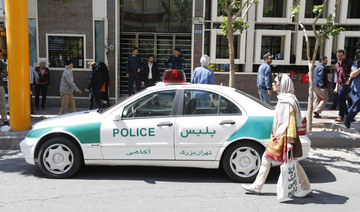BEIRUT: Two people were killed — one a civilian and the other, according to the Israeli army, the head of Iran-backed Hezbollah’s anti-tank rocket unit — and seven others injured on Wednesday in renewed Israeli hostilities in several towns in southern Lebanon.
An Israeli drone targeted a motorcycle in the town of Jouaiyya at noon, and a passing car was hit, injuring those inside.
The emergency operations center at the Ministry of Health reported that two people were killed, Hezbollah member Hassan Fares Jeshi and a civilian named Mohammed Hassan Shoumar, while four others were injured.
The Israeli army said: “Hassan Fares is the commander of Hezbollah’s anti-tank rocket unit.”
Israeli artillery shelling and air raids continued on border towns known for their loyalty to Hezbollah. These attacks hit the towns of Blida, Tayr Harfa, Khiam, Jebbayn, Chihine, Majdelyoun, Naqoura, Zibqin, Chaqra, Baraachit, Halta, Kounine, Mhaibib, and Kfarkela.
The emergency operations center said that “phosphorus artillery shelling targeted the town of Shebaa, causing a citizen to suffer from suffocation, requiring hospitalization.”
Hezbollah responded by targeting “the Raheb site and the Jal Al-Alam site with artillery shells, and the Malikiyah site with missile weapons.”
Israeli warplanes breached the sound barrier for the second successive day over Beirut.
The National News Agency in Lebanon reported that Israeli aircraft did the same in two waves over the cities of Sidon and Jezzine, and various parts in the south of the country, with activists on social media sharing footage of planes breaching Lebanese airspace.
Inhabitants of Beirut and dozens of towns in the Mount Lebanon region had experienced severe panic on Tuesday as Israeli warplanes broke the sound barrier at low altitude, causing a loud boom.
Border villages adjacent to the Blue Line in the western and central sectors suffered hours of tension later in the day with the Israeli army firing flares, while Hezbollah carried out nine operations against Israeli military sites.
Hezbollah’s Secretary-General Hassan Nasrallah said in a speech on Tuesday that a response to last week’s assassination of the group’s prominent military leader Fuad Shukr was “inevitable.”
The Israelis are also anticipating the response of Hezbollah and Iran to the assassination of Hamas’ political chief Ismail Haniyeh in Tehran just hours after Shukr’s death in the southern suburbs of Beirut.
Israeli Defense Minister Yoav Gallant said: “The Israeli army is constantly developing its defensive and offensive capabilities.”
Meanwhile, leaflets were dropped on Wednesday in predominantly Druze regions, especially in the Choueifat area, bearing pictures of the children who were victims of the Majdal Shams attack in the occupied Golan, which killed 12 people. These carried the words: “We will avenge them, Hezbollah.”
Israel has accused Hezbollah of shelling the soccer field in Majdal Shams, but Hezbollah strongly denies responsibility for the attack, while Lebanese Druze leader Walid Jumblatt has declared his support for the Iran-backed group.






























